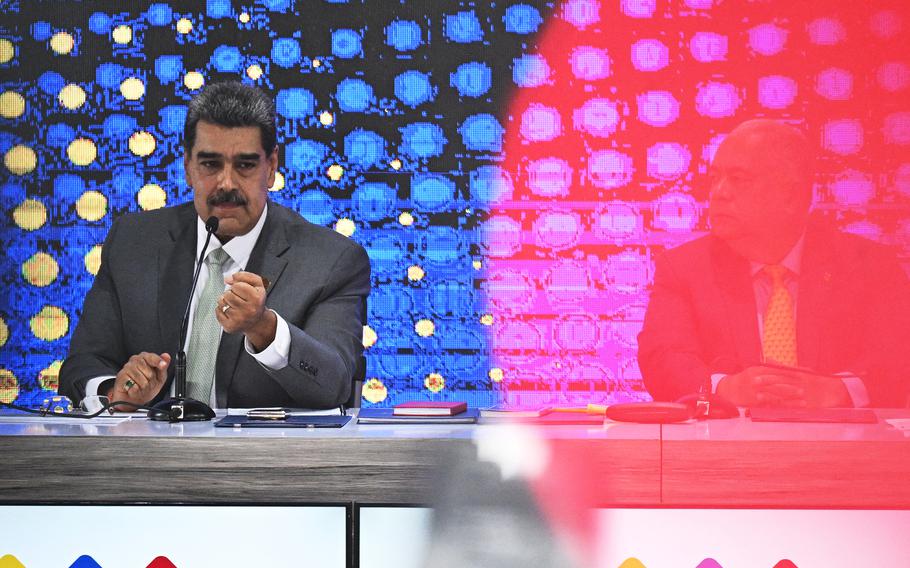
Venezuelan President Nicolas Maduro speaks during a press conference a day after the consultative referendum on Venezuelan sovereignty over the Essequibo region controlled by neighbouring Guyana, at the CNE headquarters in Caracas on Dec. 4, 2023. (Federico Parra, AFP/Getty Images/TNS)
(Tribune News Service) — The Venezuelan government claimed an overwhelming victory in the referendum held on Sunday to acquire blank-check powers to invade Guyana, saying it had obtained 10.55 million votes, or 97.8% of the total cast, in its favor, but the reported participation did not match the empty voting stations seen during the day and was more than twice as high as that of independent exit polls.
In what was declared as an existential threat by Guyana, the Caracas socialist regime held the five-question referendum asking Venezuelans if they were in favor of creating a new state to be called Guayana Esequiba, in what would amount to adding to the Venezuelan map about three quarters of the land occupied by Guyana.
The Nicolas Maduro regime held the vote despite a decision from the United Nation’s International Court of Justice ordering Venezuela to “refrain from taking any action which would modify the situation that currently prevails in the territory in dispute”, which is currently under the control of the Co-operative Republic of Guyana.
Late Sunday night, Maduro celebrated the results announced by the National Electoral Council. “Today the people spoke loud and clear and we are going to begin a new, powerful stage, because we carry the mandate of the people, we carry the voice of the people. … We must fight for our Guayana Esequiba. May this help us fight for peace.”
But there were very few voices outside the regime that accepted the results, with international news agencies reporting that the numbers provided by the government-controlled electoral council were not credible, amid the empty streets and even emptier voting stations seen throughout the day.
A wire story from the EFE news agency reported that less than 12% of those registered had voted in different centers in Caracas three hours before they were scheduled to close.
The 10.55 million vote announced by the electoral council translate to a participation of more than 51% of the 20.69 million of Venezuelans registered to vote, but those numbers were doubtful, even among local news reports claiming that regime officials were forcing public employees into participating.
Rubén Chirinos, whose polling firm Meganalisis monitored the elections, said participation did not surpass 22% of registered voters.
The electoral council’s ability to conduct fair and transparent elections has been questioned for decades, given that it is completely controlled by the regime and lacks independent supervision. Claims that Maduro committed fraud during the 2018 election led to the United States and 50 other nations to declare that he was usurping the presidency.
While it is unclear what Maduro plans to do with the announced results, the referendum sought a blank check from voters to seize a chunk of land slightly smaller than the state of Florida, which would alter the rights and citizenship of more than 230,000 Guyanese who have no ties to the Spanish-speaking country.
In dispute is the oil- and mineral-rich Essequibo region, which Maduro claims belongs to Venezuela despite an 1899 ruling by international arbitrators that established the current borders between the two countries. The border dispute has been before the U.N.’s international court for years. In September, Maduro’s National Assembly approved a resolution to put the question about the territory’s ownership before voters.
Observers have noted that a U.N. court decision on the larger border dispute is still years away. However, in its ruling the court warned that both Guyana and Venezuela “shall refrain from any action which might aggravate or extend the dispute before the Court or make it more difficult to resolve.”
The court said that Guyana is the one currently administering and exercising control over the area under dispute and that “the Court, considers that, pending the final decision in the case, Venezuela must refrain from taking any action which would modify that situation.”
“The Court emphasizes that the question of the validity of the 1899 Award and the related question of the definitive settlement of the land boundary dispute between Guyana and Venezuela are matters for the Court to decide at the merits stage,” the court said.
©2023 Miami Herald.
Visit miamiherald.com.
Distributed by Tribune Content Agency, LLC.